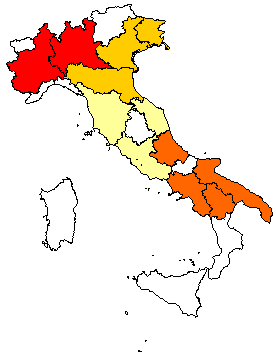Industrial districts, technologies, and networks (1999-2006) |
|
A core TeDIS research area is the study of Industrial Districts and SMEs embedded in local manufacturing contexts and their evolution process in relation to Network Technologies. The objective of the research is to analyse the level of convergence between the district economic model of development and ICT opportunities.
The research area is made by:
TeDIS Survey: Networks and Technologies for SMEs
Industrial districts as local networks of small and medium enterprises rooted their competitiveness in a mix of economic relationships and social ties. Recently network technologies have promised gains of efficiency through a reduction in transaction costs and showed new commercial opportunities for small firms; ICTs allow an enlargement in the spatial dimension of relationships, especially in a global economic scenario where the capacity to enter in an international network of innovation and knowledge production seems to be a strategic resource for the competitiveness.
TeDIS Survey was launched in 1999 and main goals are: a. to observe and evaluate the diffusion of Information and Communication Technologies among SMEs belonging to local manufacturing systems (Industrial districts);
As these goals, the most important evolutionary trends of industrial districts SMEs (internationalisation, innovation) are systematically observed besides ICT diffusion. Periodically specific research will be conducted focusing on themes that emerge from the general Survey.
In 2010 the Survey has been enlarged to comprehend a set of enterprises of small dimension. Traditionally the survey was focused on companies with incomes bigger than 2,5 Meuro per year giving emphasis to the medium enterprises role on the development processes of the national economy. In 2010 the survey has been extended to enterprises with more than 1 Meuro of incomes per year in order to analyze their dynamics of competitiveness and their strategies in the globalization processes, with a particular attention on the competitive advantages of this enterprises in the global value chain.
Methodology The Survey is focused on the main Italian industrial districts representing the so-called "Made in Italy": engineering, fashion (textiles, eyewear, shoes, and sportswear), home furnishings (furniture, glass, tiles), and food. In 1999 12 industrial districts of North East Italy were studied; at present they are 45 in the whole Italy. Only bigger firms within districts (at least more than 2.5 million euros of turnover) are object of the Survey; those firms have a more structured organisation and a potential higher investment capacity in ICT. Moreover, they are often leading firms and, according to the literature, their strategies are relevant in designing the evolution paths of the whole district. In 2006 the survey has been extended to not district firms (Northern Italy).
The map of the Italian Industrial Districts
The Enterprise evolution model research program
The results of the TeDIS Survey highlight the centrality of the role of the enterprise in the technology qualification process of local networks. Innovative enterprises have demonstrated their knowledge in redefining the origins of their own competitive advantage by combining their territorial context with original strategies.
TeDIS research on network enterprise aims at investigating the characteristics of the convergence process between enterprise and new technologies in order to outline the characteristics of network enterprises as an emerging model of production organization, in which network technologies prove to be a significant element.
Methodology Enterprises in different industrial sectors (mechanics, electronics, fashion, house-furniture) and districts of particular interest due to their importance in their respective markets in addition to their visibility as leaders in strategic innovation areas are involved. They are studied through the methodology of case study and are involved in focus groups.
Specific topics covered are:
Related Projects • ICT for the excellence of the territory
Reports and Publications - Micelli S., Chiarvesio M., Di Maria E. (2010); "Global Value Chains and Internationalization of SMEs" Working Paper “Marco Fanno” n. 118: http://www.decon.unipd.it/assets/pdf/wp/20100118.pdf - Chiarvesio M., Di Maria E.(2009); "ICT and Innovation Processes in SMEs Inside and Outside Districts": http://www.decon.unipd.it/assets/pdf/wp/20090100.pdf - Chiaversio M., Micelli S. (2009), " Le tecnologie di rete nelle PMI del Nord Est: diffusione e strategie", in Marini D., Oliva S. (a cura di), Rapporto Nord Est. X Rapporto sulla società e l'economia, Marsilio, Venezia. |
||||||||
 |
 |
 |

